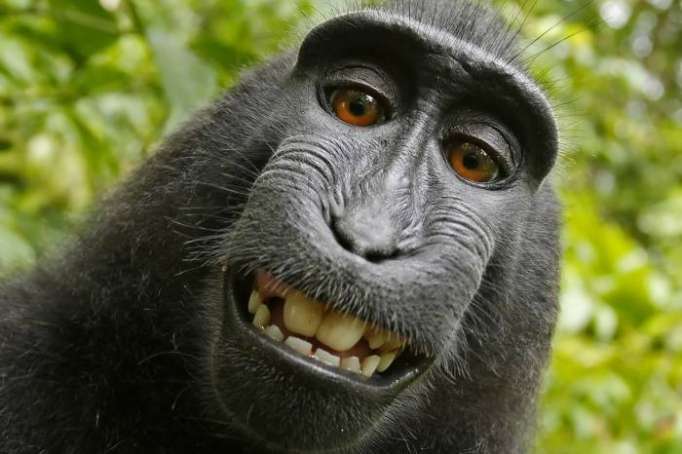That is what a federal appellate court ruled Monday, in denying the People for the Ethical Treatment of Animals’ request to bring copyright claims on behalf of a macaque monkey.
The animal-rights organization sued a wildlife photographer in 2015, claiming he shouldn’t own the copyright for a series of selfies snapped four years prior by an Indonesian monkey named Naruto. PETA argued Naruto himself is the copyright owner of the photos, which capture the black-haired crested macaque grinning broadly at the camera, amber eyes blazing.
But animals have no legal ability to hold copyright claims, the Ninth U.S. Circuit Court of Appeals said in its decision, which also questioned PETA’s motives in bringing the case.
“PETA seems to employ Naruto as an unwitting pawn in its ideological goals,” the court wrote in a footnote.
The organization had tried to sue the photographer, David Slater, as a “next friend” of the monkey, a designation sometimes used for a third-party to sue on another’s behalf. PETA’s tie to the macaque, however, doesn’t seem “any more significant than its relationship with any other animal,” the Ninth Circuit found.
As Judge N. Randy Smith added in a concurring opinion, “We have no idea whether animals or objects wish to own copyrights or open bank accounts to hold their royalties from sales of pictures.”
Naruto apparently took the photos of himself after coming across Mr. Slater’s unattended camera in a reserve on the island of Sulawesi, Indonesia, according to the opinion. Mr. Slater has said in interviews that he tried to encourage animals to take their own photos.
After arguments before a three-judge Ninth Circuit panel last summer, PETA asked the court to withdraw the appeal and announced it struck a settlement with Mr. Slater that included a percentage of his profits from the monkey selfie going toward charities that protect crested macaques and their Indonesia habitats. The monkey, however, wasn’t part of the deal.
That move, Judge Smith wrote in a footnote, leads him to believe “PETA’s real motivation in this case was to advance its own interests, not Naruto’s,” and that PETA moved quickly to protect itself “when it came down to a possible negative, precedential ruling.”
PETA’s general counsel, Jeff Kerr, said Monday that the opinion misses the point that Naruto “undeniably took the photos,” and that denying him rights under the U.S. Copyright Act “emphasizes what PETA has argued all along—that he is discriminated against simply because he’s a nonhuman animal.”
Andrew Dhuey, a lawyer for Mr. Slater, said he hadn’t yet heard from his client, who lives in Wales. Mr. Dhuey said he viewed the opinion as a total win for the photographer.
In 2004, the Ninth Circuit ruled that animals could have standing to sue, in a case involving whales, dolphins and porpoises allegedly harmed by Navy sonar. The judges hearing the monkey case urged the full Ninth Circuit to re-examine that ruling, known as the Cetacean case, but recognized that meanwhile, it leaves open the possibility that “non-human animals enjoy constitutional standing to pursue claims in federal court.”
Despite the precedent established in the Cetacean case, the Ninth Circuit panel said the federal Copyright Act doesn’t give animals the right to file copyright-infringement suits.
In addition to animals, backers of the “rights of nature” movement have argued that rivers and other natural elements should be able to pursue claims in court.
The Wall Street Journal
More about: copyright
















































